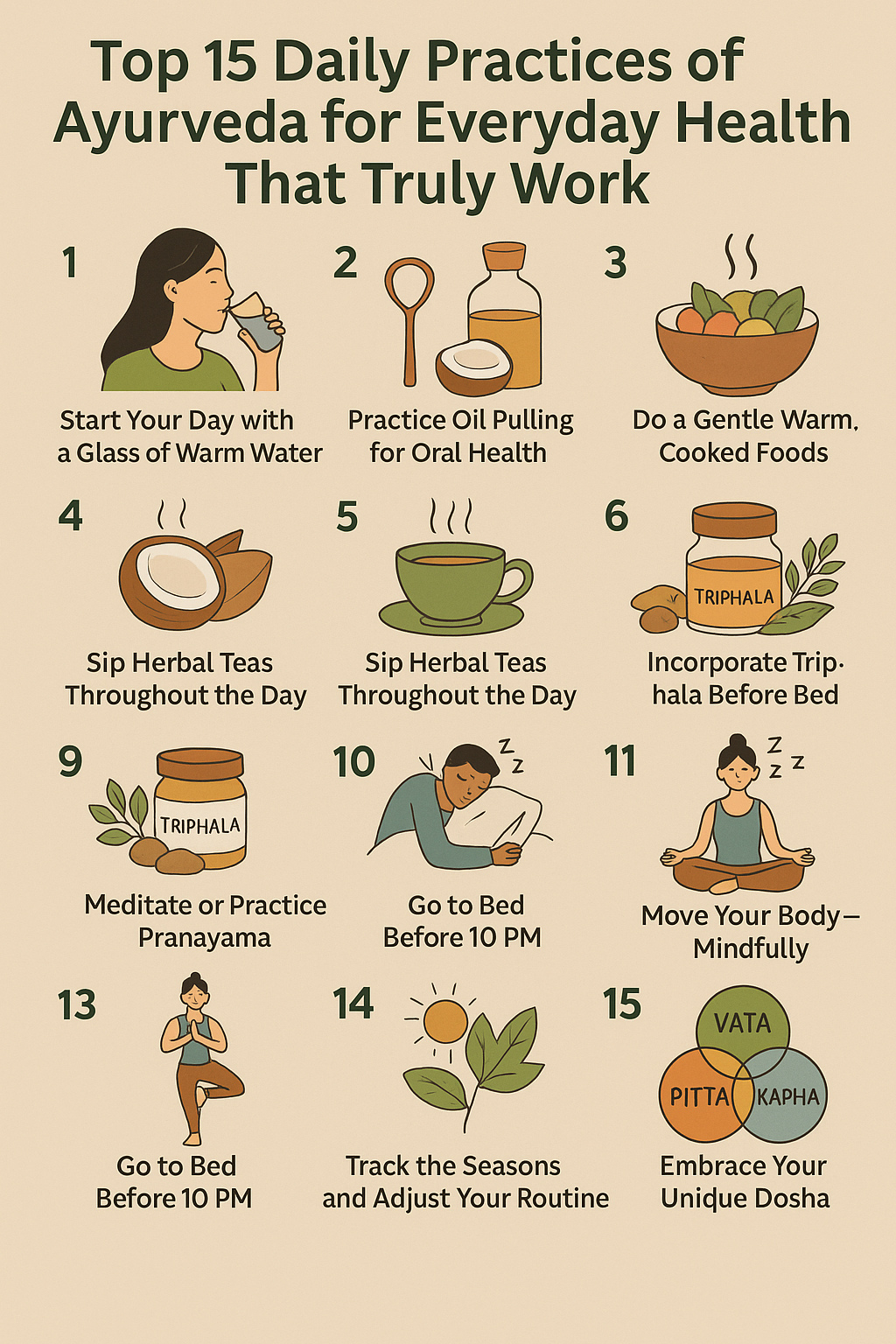
Table of Contents
ToggleIntroduction to Ayurveda and Its Role in Daily Wellness
Ayurveda, meaning “science of life” in Sanskrit, is a holistic healing system from India, over 5,000 years old. It emphasizes balance—mind, body, and spirit—as key to well-being.
Central to Ayurveda are three energy types orr doshas: Vata (air + space), Pitta (fire + water), and Kapha (earth + water). Each person has a unique dosha combination, and harmony among them prevents illness and promotes vitality.
In today’s fast-paced world, Ayurveda offers grounded, time-tested practices for restoring health and balance. Small, mindful changes can lead to major improvements.
Daily Routines in Ayurveda (Dinacharya)
Ayurveda recommends daily habits, or Dinacharya, to align with nature’s cycles. These rituals cleanse, energize, and stabilize your system.
Key habits include:
- Waking up before sunrise: Syncs energy with nature.
- Oil pulling (Gandusha): Detoxes mouth and gums.
- Tongue scraping: Removes toxins, improves digestion.
- Abhyanga (self-massage): Calms nerves, nourishes tissues.
- Meditation or prayer: Grounds mind, sets a peaceful tone.
Adopting even a few of these routines makes your day more grounded and vibrant. Dinacharya’s simplicity and adaptability require no expensive gear or extensive time, yet profoundly shift how you feel.
Ayurvedic Diet Principles for Everyday Energy
In Ayurveda, food is medicine. Eating is about agni, or digestive fire. A strong agni means efficient nutrient absorption and toxin removal, leading to sustained energy, clear thinking, and emotional stability.
Ayurvedic eating emphasizes warm, fresh, seasonal foods and avoiding leftovers and processed items to strengthen digestion. Meals should be timed, with the largest at midday when digestion is strongest.
Eating according to your dosha enhances harmony:
- Vata typesbenefit from grounding, moist foods like soups and stews.
- Pitta individualsthrive on cooling foods like cucumbers and leafy greens.
- Kapha typesneed light, spicy foods like lentils and bitter greens.
Stop eating before you’re completely full to aid digestion and prevent toxins (ama). This practice, known as eating to three-quarters capacity, supports digestion.
Spices like cumin, coriander, ginger, and turmeric boost agni and vitality, aiding digestion and nutrient absorption.
Tips for Daily Ayurvedic Eating:
- Eat warm, fresh, and seasonal foods.
- Avoid leftovers and processed items, which weaken digestion.
- Eat according to your dosha:
Vata: grounding, moist foods like soups and stews.
Pitta: cooling foods like cucumbers and leafy greens.
Kapha: light, spicy foods like lentils and bitter greens.
Stop eating before you’re completely full to avoid overwhelming digestion.
Adding spices like cumin, coriander, ginger, and turmeric can further boost your agni and support everyday vitality.
Herbs and Spices That Support Daily Health
Ayurveda is rich in plant-based remedies that have been used for centuries to support immunity, digestion, and emotional well-being. These herbs can be easily included in your daily routine as teas, powders, or capsules.
Top Everyday Ayurvedic Herbs:
| Herb | Benefits | How to Use |
| Ashwagandha | Reduces stress, supports energy | Powder in warm milk or capsule |
| Turmeric | Anti-inflammatory, boosts immunity | In cooking or golden milk |
| Tulsi (Holy Basil) | Respiratory health, stress relief | As herbal tea |
| Triphala | Gentle daily detox, improves digestion | Powder or tablet before bed |
| Brahmi | Enhances focus, calms the mind | Tea, oil, or supplement |
These herbs are widely available and offer gentle yet powerful support for overall well-being.
Ayurvedic Remedies for Immunity and Disease Prevention
Ayurveda focuses on building ojas—a subtle energy that reflects immunity, resilience, and vigor. To prevent illness, Ayurveda recommends nurturing ojas through wholesome food, rest, mindfulness, and specific herbal formulas.
Everyday Immunity Boosters:
- Chyawanprash: A herbal jam rich in Vitamin C and antioxidants.
- Turmeric milk (Golden milk): Fights inflammation and boosts immunity.
- Warm water with lemon and honey: Clears toxins and stimulates digestion.
- Nasya (Nasal oiling): Applying oil in the nostrils to protect respiratory health.
These practices not only shield you from seasonal illnesses but also promote long-term health.
Read : .Best Plant-Based Protein Powders for Every Need
Mind-Body Connection and Stress Management
Stress is one of the biggest disruptors of health. Ayurveda acknowledges the mind-body link and offers daily strategies to manage mental stress naturally.
Top Practices for a Calm Mind:
- Meditation (Dhyana): 10-15 minutes daily to calm the nervous system.
- Breathwork (Pranayama): Alternate nostril breathing (Nadi Shodhana) balances both brain hemispheres and soothes anxiety.
- Herbs like Ashwagandha and Brahmi: Adaptogens that help you handle daily stress without burnout.
Maintaining emotional balance through Ayurveda can help reduce inflammation, improve sleep, and boost overall joy.
Ayurveda for Skin, Hair, and Beauty Health
True beauty comes from balance and inner vitality. Ayurveda emphasizes nourishing the body from the inside and using natural, chemical-free ingredients externally.
Read: Amla is a superfood that promotes heart health and hair growth.
Daily Ayurvedic Beauty Tips:
- Oil massage (Abhyanga): Improves circulation and softens skin.
- Neem paste or turmeric masks: Prevent acne and reduce pigmentation.
- Hair oils (like Bhringraj or Brahmi): Strengthen hair and reduce scalp dryness.
Ayurvedic beauty isn’t about covering flaws but enhancing natural glow through proper care and nourishment.
Physical Activity and Movement in Ayurveda
In Ayurveda, movement isn’t just about burning calories—it’s about maintaining the free flow of energy (prana) throughout the body. The type, intensity, and timing of exercise should align with your dosha to avoid imbalance.
Best Movement Practices by Dosha:
| Dosha | Recommended Activity | Tips |
| Vata | Gentle yoga, tai chi | Practice in warm, calm environments |
| Pitta | Swimming, cycling | Avoid midday sun and intense heat |
| Kapha | Jogging, dancing, HIIT | Exercise early in the morning to energize |
Daily Movement Tips:
- Practice sun salutations (Surya Namaskar) each morning.
- Avoid over-exercising, especially if you feel fatigued or emotionally drained.
- End your day with gentle stretches or restorative yoga to promote relaxation.
Ayurveda teaches that movement done mindfully enhances circulation, detoxifies tissues, and supports mental clarity.
Ayurvedic Sleep Hygiene and Restorative Practices
According to Ayurveda, Nidra (sleep) is one of the three pillars of health. Proper sleep restores energy, repairs tissues, and calms the mind. Irregular sleep patterns can disturb your doshas and lead to fatigue, digestive issues, and mood swings.
Daily Sleep Recommendations:
- Sleep by 10 PM, when Kapha energy (slow, heavy) supports natural drowsiness.
- Avoid screens and heavy meals at least an hour before bed.
- Use herbal teas like chamomile or Brahmi for relaxation.
- Try foot massage with warm sesame oil to calm Vata and promote restful sleep.
Developing a soothing bedtime routine can dramatically improve both the quality and quantity of your rest.
Hydration and Detox Practices
Ayurveda places great emphasis on keeping the body hydrated and regularly eliminating toxins (ama). The key is not just how much you drink, but what and when.
Daily Hydration Habits:
- Drink warm or room temperature water, especially in the morning.
- Avoid cold or iced drinks, which can weaken digestive fire (agni).
- Sip herbal teas like ginger, fennel, or cumin after meals.
Gentle Detox Tips:
- Start your day with a glass of warm water and lemon.
- Take Triphala at night to support natural elimination.
- Incorporate sweating through mild exercise or sauna use to help flush toxins.
Consistent detox and hydration help maintain energy, support digestion, and clear the skin.
Ayurveda for Women’s and Men’s Everyday Wellness
Ayurveda recognizes that women and men have unique physiological and hormonal needs. Tailoring routines by gender helps maintain hormonal harmony, energy, and reproductive health.
For Women:
- Shatavari: Supports hormonal balance and fertility.
- Warm sesame oil massage: Eases menstrual discomfort.
- Emphasize rest and nourishing foods during the menstrual cycle.
For Men:
- Ashwagandha: Boosts vitality, testosterone levels, and stress resilience.
- Gokshura (Tribulus): Supports urinary and reproductive health.
Both genders benefit from routines that align with their life stages—adolescence, adulthood, or elder years—ensuring long-term health and vitality.
Ayurvedic Products You Can Use Every Day
Modern Ayurveda offers a variety of ready-to-use products that fit seamlessly into daily routines, combining tradition with convenience.
Top Daily Ayurvedic Products:
| Product Type | Examples | Uses |
| Herbal Teas | Tulsi, CCF (Cumin-Coriander-Fennel) | Digestion, stress relief, hydration |
| Oils | Coconut, Bhringraj, Mahanarayan | Hair, body massage, joint health |
| Supplements | Ashwagandha, Triphala, Chyawanprash | Immunity, digestion, energy |
| Oral Care | Neem toothpaste, oil pulling blends | Daily dental hygiene |
When choosing products, look for certifications like GMP, USDA Organic, or Ayush-approved to ensure authenticity and safety.
Customizing Ayurveda for Your Unique Constitution (Prakriti)
Understanding your Prakriti (unique mind-body type) is key to applying Ayurveda effectively. Everyone has all three doshas, but usually one or two dominate.
How to Find Your Dosha:
- Take a dosha quiz or consult an Ayurvedic practitioner.
- Observe physical traits, digestion, emotions, and energy levels.
- Your dosha helps tailor your diet, sleep, exercise, and herbal regimen.
Benefits of Personalization:
- Faster results with health improvements.
- Better stress response and emotional balance.
- Stronger immunity by preventing specific imbalances.
Ayurveda isn’t one-size-fits-all—it’s a personalized science of wellness.
FAQs on Ayurveda for Everyday Health
Q1: Can I follow Ayurveda without knowing my dosha?
Yes! Start with universal practices like warm water, seasonal eating, and stress management, then personalize as you learn more.
Q2: How long does it take to see results with Ayurveda?
Some results are immediate (like better sleep or digestion), while deeper changes may take weeks or months.
Q3: Is it safe to mix Ayurveda with Western medicine?
Usually, yes. But always consult both your doctor and an Ayurvedic practitioner before combining systems.
Q4: Can kids follow Ayurvedic routines?
Yes, Ayurveda has child-friendly guidelines for diet, immunity, and routines.
Q5: Are Ayurvedic products available outside India?
Yes, many certified brands ship globally—just ensure authenticity and safety.
Q6: Do I need to become vegetarian to follow Ayurveda?
Not necessarily. Ayurveda respects bio-individuality. Light meats may be suitable for some doshas in moderation.
Conclusion:
Ayurveda is a time-tested, holistic system that nurtures your body, mind, and spirit by aligning with your natural rhythms. Instead of offering quick fixes, it promotes lasting wellness by working with your body’s innate healing ability.
You don’t need to overhaul your life to get started. Simple daily habits—like sipping warm water in the morning, using digestive spices, or sticking to a regular sleep schedule—can spark powerful changes over time.
As you explore your unique constitution (dosha), Ayurveda becomes a personal journey of self-awareness and vitality. It’s about more than preventing illness—it’s about thriving.
This ancient wisdom fits beautifully into modern life, helping you meet today’s health challenges with grace and balance. Whether your goal is to boost energy, reduce stress, or feel more in tune with nature, Ayurveda offers a gentle, effective path to lasting well-being—one mindful step at a time.



